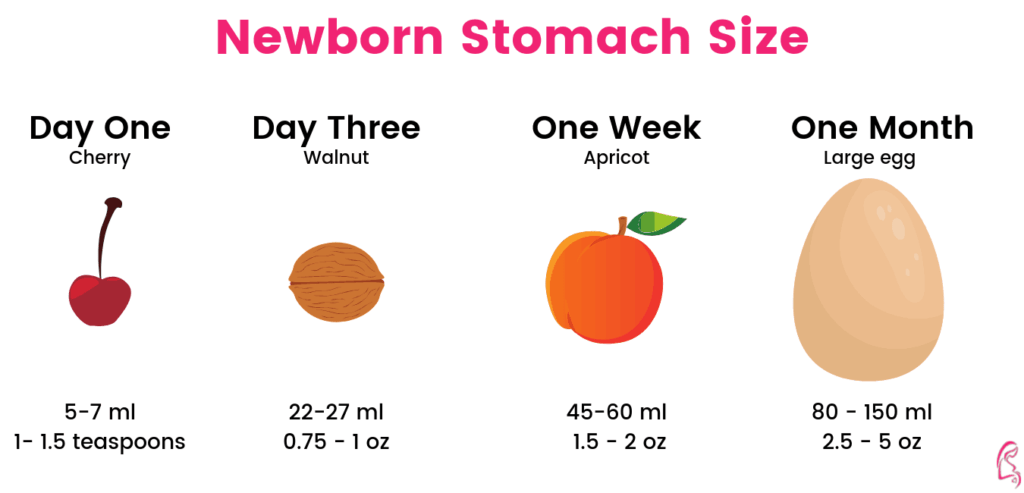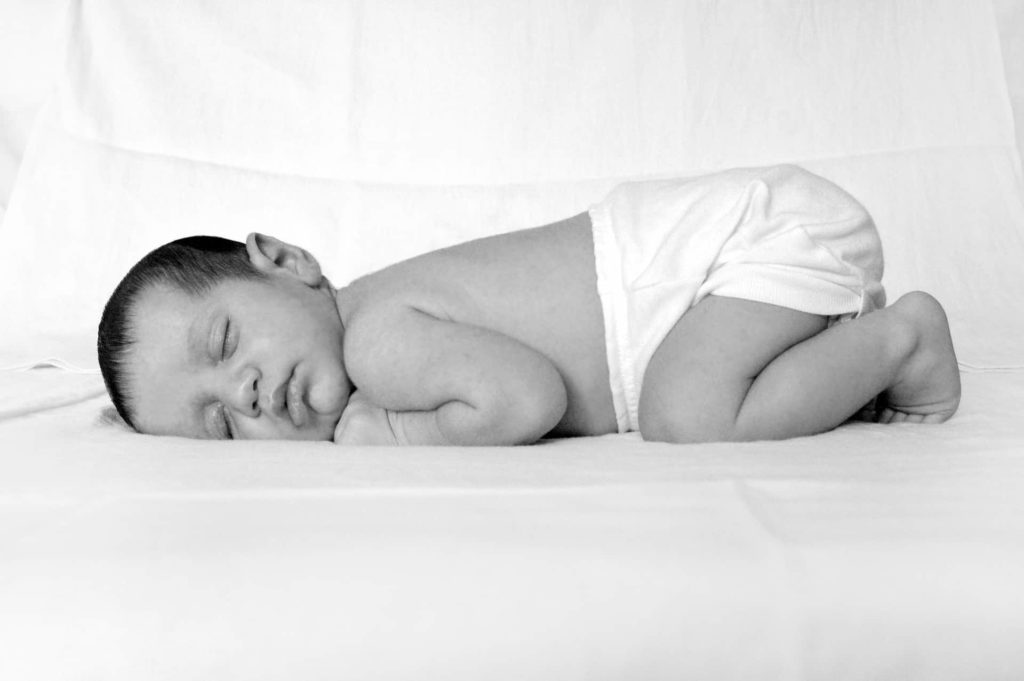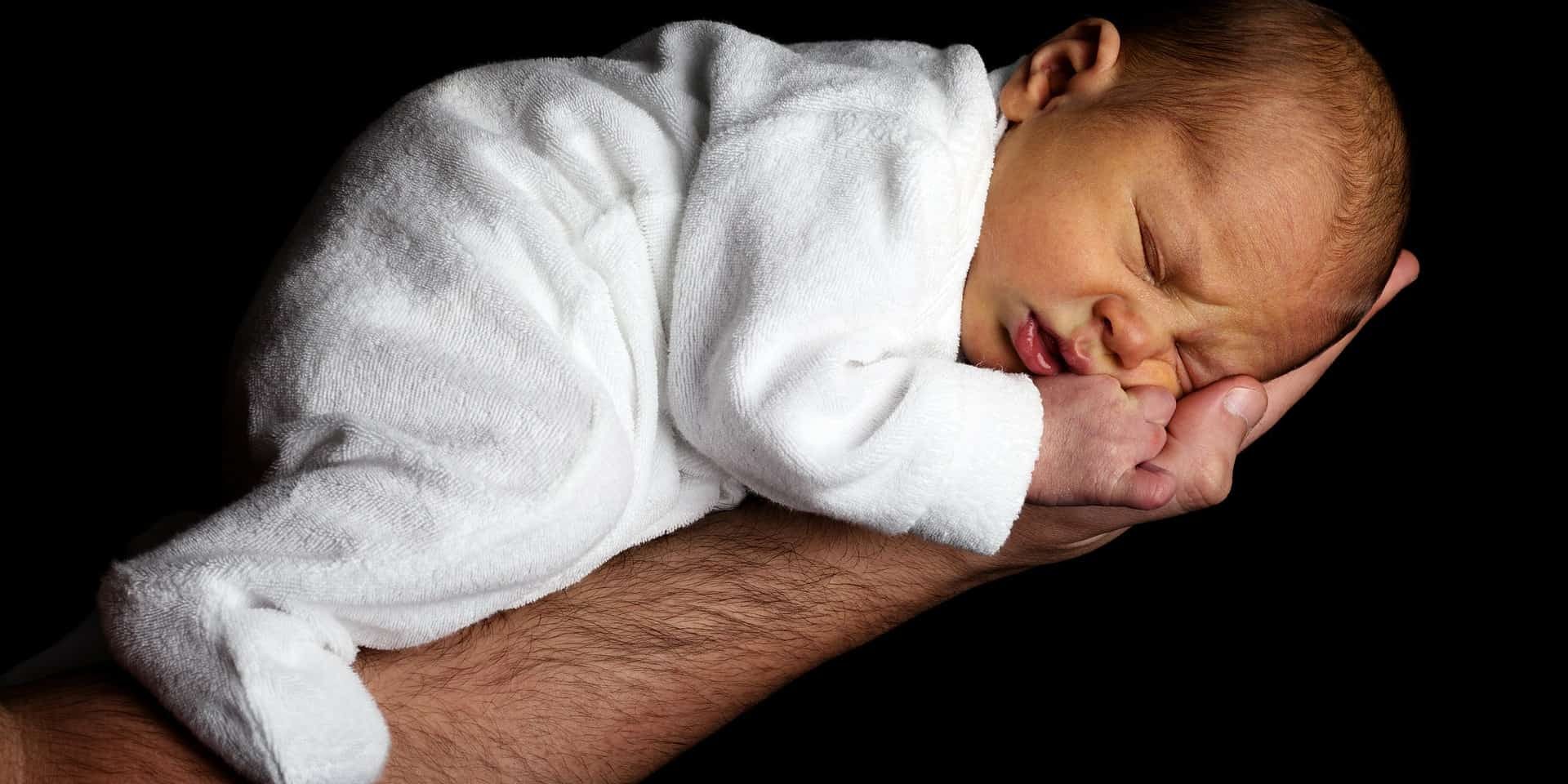Whether this is your first baby or your fifth baby, bringing home a newborn baby is an exciting but scary time. When they cry, you stress about how to soothe them. When they don’t cry, you stress about that weird noise they just made which was unlike their other weird noises. This article is all about what to do in those anxious few weeks when you first bring your baby home. Everything from feeding, to bathing, to your own mental health.
Newborn Feeding
You will probably feel like your baby isn’t eating enough, but newborns’ stomachs are so tiny that they really can’t manage much of a feed at once. On the first day, your baby’s stomach is the size of a single cherry, growing to the size of an apricot by 1 week old. Since their stomachs are so small, they need to be fed about every 2-3 hours. Don’t feel like you need to stick to any certain schedule right away, just aim to feed them whenever they’re hungry.
As you get to know your baby more you’ll start to recognise the signs that they’re hungry. Some babies will cry, but some babies might just suck on their hands or start rooting around for a nipple to latch onto. Also, you’ll get to know how long your baby can last between feeds. This is especially helpful to avoid those screechy crying sessions while you rush to prepare a bottle.
Some babies are extremely sleepy and may need to be woken up to feed every 2 hours. This may feel counterproductive, but if your baby sleeps for too long they may become lethargic from hunger, making it harder for them to stay alert long enough to feed. If you have a particularly sleepy baby, try removing a layer of clothing before feeds or speaking to them throughout. It’s important that your baby is actually eating during feeds, rather than just using the bottle/breast as a soother while they sleep.
Although they’re eating so often, newborns still lose up to 10% of their body weight in the first few days. Usually, babies regain this weight by 2 weeks old. Once they’re feeding every 2 hours successfully then their weight should pile on easily. Your baby nurse will let you know if your baby’s weight-gain is on track.

Newborn Burping
Some babies need a lot of help with burping and other will burp the second you move them. You can burp your baby whenever you switch breasts or every 2 oz of the bottle. Gentle circular motions on their back will help their wind come up, or you could pop them over your shoulder or face-down across your lap.
Sometimes your baby will develop hiccups, this is because the air entering their stomach is pushing on their diaphragm (between their stomach and lungs) and causing spasms. The hiccups will go away after a few minutes and are not harmful to your baby. If you’re finding that your baby gets hiccups very often, you may need to burp them more often during feeds or prop them up whilst feeding.
Spitting up after feeding is also caused by wind. When the air bubbles make their way from the stomach they sometimes force some milk up too. Although this is normal, consult your doctor if your baby spits up a lot, or arches their back while spitting up – they may have reflux. Also consult your doctor if your baby forcefully vomits after 2 feedings in a row, as this is bad for their nutrition levels.
Newborn Nappies
More specifically, the contents of a newborn’s nappies.
Your baby’s very first poops are called meconium. These are black with a tar-like consistency and are made up of anything your baby ingested in the womb, like skin cells, lanugo (hair), mucus, amniotic fluid, bile, and water. After a few days, a breastfed baby will start to produce seedy poops which are either green, light brown, or dark yellow. A bottle-fed baby’s poops tend to be paste-like in consistency and vary more in colour. Take note of how often your baby has a bowel movement and watch out for white or red flecks in their nappy. If you notice white or red flecks in your baby’s poo, consult your doctor straight away.
As for wet nappies, a breastfed baby will have at least 5 wet nappies per day, while a bottle-fed baby will have about 10 wet nappies per day.
“Normal” is a very wide spectrum with babies. It’s best to watch out for any sudden changes which may be an indication that there’s something wrong.

Newborn Crying
For the first few days, your baby is on their best behaviour. They mostly eat, sleep and repeat. Don’t let the good behaviour fool you, by 2 weeks old they’ll be crying about 2 solid hours per day. Time spent crying will usually increase until 6-8 weeks and then begin to reduce. With time you’ll begin to learn why your baby is crying, until then just go through the list of usual complaints such as dirty nappy, hungry, uncomfortable, etc. A major cause of newborn fussiness is overstimulation, meaning they get frustrated if there’s too much noise or activity around them. This could be why your baby seems fussier when your family and friends come to visit (they’re not just making a show of you!).
Sometimes your baby will cry for no reason. Once you’ve ruled out any physical needs like hunger and tiredness, it could be emotional needs which are causing your baby to cry. Listen to your parental instincts and don’t worry about spoiling your newborn. Newborn babies are not capable of deciphering “if I cry then mammy picks me up”. Sometimes they will feel insecure or anxious about their new environment, so your cuddles will be exactly what the doctor ordered. Also, studies show that babies whose cries are responded to quickly are less likely to cry for no reason. This is because they have built a foundation of trust and feel more secure in themselves. It’s recommended to respond to every cry until your baby is at least 6 months old.
Newborn Sleep
Your newborn baby will sleep 16 – 18 hours in total per day. They’ll usually sleep best in your arms, in a baby carrier or a car seat because they’re more snug. However, in the interest of sleep safety, it’s best for them to learn to comfortably sleep in the Moses basket, crib or pram. If your baby sleeps in your arms or attached to you by a baby carrier, they’re sharing your body heat which can cause them to overheat. If they sleep too long in a car seat which is not mounted in the car they can find it difficult to get enough air due to the incorrect angle. The best way for a baby to sleep is on a firm, flat surface with no blankets, teddies, or pillows. Check out our blog all about Sleep Safety for more.
Once your baby is asleep, they may make weird noises including some light snoring. Babies naturally breathe through their nose so you can reduce their noisy sleeping by keeping their noses clear of any blockages (big snots). Use a bulb syringe to clear their nose and help them to breathe easy. Clearing their nose also helps them to latch on stronger and longer!
Newborn Breathing
Most new parents will admit that they spend a lot of time worrying about their newborn’s breathing. Newborns do this thing called periodic breathing (possibly to drive us insane), this is when they stop breathing for about 10 seconds, followed by about 15 seconds of fast shallow breathing. Periodic breathing is more common among premature babies, but full-term babies do it too. Your baby will grow out of this and it’s normal. However, if they stop breathing for more than 15 seconds or they turn pale, blue or limp, consult your doctor immediately.
Pay special attention to breathing during feeding. This is when they rely on their nasal passage to bring all the oxygen. If your baby turns a slight blue-ish colour while feeding, similar to the colour your hands go when they’re cold, you should visit your doctor.
Other breathing-related signs that your baby should see the doctor include:
- Deep cough
- “Barking” Cough
- Grunting
- Wheezing/Whistling
- Heavy rasping
- Flaring their nostrils consistently
- Sucking in the skin above their collarbone
- Sucking in the skin between/below their ribs
Newborn Bathing
Your baby will probably still have their umbilical cord attached when they brave their first bath time. Don’t submerge the umbilical cord stump in water as moisture can lead to an infection. Until the area is completely healed, stick to sponge baths. Newborns really only need to be bathed 2 – 3 times per week, any more than this you’ll dry out their skin. As long as you wipe down their neck and nappy area with a damp cloth a few times per day, they don’t really need much more cleaning. Baby bath water should be about body temperature (37 degrees celsius) you can use a thermometer or dip your elbow in the bath water to check the temperature. The water should not feel hot or cold.
For your newborn’s first sponge bath you can simply lay them on a soft flat surface (maybe a towel on the couch) with a basin of warm water and a sponge/washcloth beside you. Undress your baby down to their nappy and wrap them in a soft towel or baby bath towel. Expose one limb at a time, clean with the sponge, dry and re-wrap to avoid your baby getting chilly. Do all limbs in this way. Then quickly unwrap your baby to clean their chest, tummy and back.
Newborns tend to have sticky discharge in their eyes due to blocked tear ducts, it’s best to gently sweep this away using cotton wool dipped in warm water.
Once their umbilical cord falls off you can do a big bath. Use a baby bath and place a towel in the bath underneath your baby to prevent them from slipping around too much. Two inches of water is plenty for a small baby’s bath. Use a warm face cloth placed on their tummy to keep them cosy and prevent any freak outs.
As with all babies, never leave them unsupervised in water. A baby can drown in less than an inch of water, in less than 60 seconds. If you need to take your eyes off the baby at all during bath time (ie. if your phone rings, someone’s at the door, etc) wrap your baby up in their towel and bring them with you.
Your Transition Home
Don’t underestimate how much of a transition this is. Whether this is your first baby or not, it’s a huge adjustment having a new little person who depends on you. It can take a few days or a few months to get your bearings. Don’t put expectations on yourself to “have it all together” just yet. Your hormones are fluctuating and your body is healing. Check out our blog all about Postnatal Recovery for more about looking after yourself during this time.







